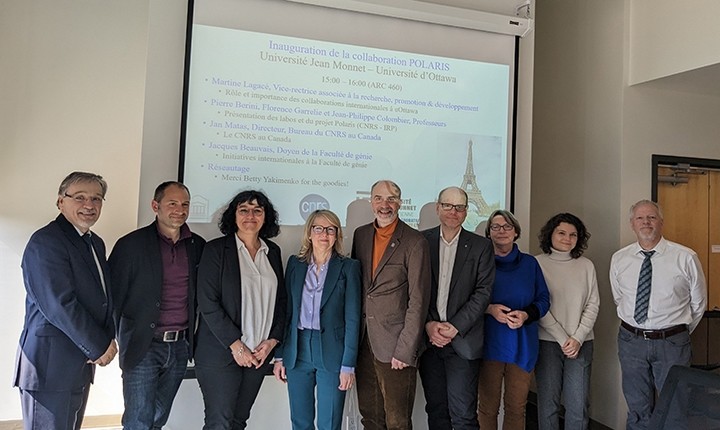Inauguration of the POLARIS International research project :A Franco-Canadian collaboration based on expertise in optics and photonics
The new POLARIS International Research Project (IRP) was inaugurated on 20th April 2023 at the Advanced Research Complex of the University of Ottawa (uOttawa). This project strengthens the close links between the Hubert Curien Laboratory (CNRS / Jean Monnet University) and uOttawa’s Photonics Research Centre.
Over the next five years, POLARIS (“PhotOnique uLtrARapide pour l'Ingénierie des Surfaces”, ultrafast photonics for surface engineering) will enable the Hubert Curien Laboratory in France and uOttawa’s Photonics Research Centre to develop collaborative research in optics and photonics. The research teams in this new Franco-Canadian partnership are committed to combining their expertise and knowledge.
POLARIS extends five years of productive scientific collaboration between the two laboratories. “Since 2018, several joint scientific development areas have been identified, based on the recognised expertise of the two laboratories in surface engineering, the ultrafast dynamics of ultrashort laser processes, the modelling of laser-matter interaction, plasmonics, sensors for harsh environments and 3D optical systems,” says Florence Garrelie, Professor at Jean Monnet University and Director of the Hubert Curien Laboratory. “Two PhDs have been jointly supervised by our laboratories, involving numerous visits to both sites, and leading to several scientific publications in international conferences and journals.”
The cooperation initiated between the two laboratories has also generated innovative technical solutions. “The joint scientific initiatives launched by our institutions in 2018 have already been productive” confirms Pierre Berini, Director of uOttawa’s Photonics Research Centre and project leader on the Canadian side. “For example, a new biosensor concept using surface plasmons propagating on a gold diffraction grating has been developed. The sensor was built at the Hubert Curien Laboratory and implemented and tested in our uOttawa laboratories by Émilie Laffont, a joint doctoral student co-supervised by Yves Jourlin and Nicolas Crespo-Monteiro from the Hubert Curien Laboratory.”
The certification of POLARIS as an International Research Project by the CNRS recognises the scientific quality of the research partnership led by the Hubert Curien Laboratory and the Photonics Research Centre since 2018. Funding has been provided by the CNRS and the two partner universities in order to support the POLARIS project until 2027.
“The aim of awarding CNRS IRP status to this collaboration is to pursue and strengthen fundamental, cutting-edge research, on photonics for surface and materials engineering, with a view to applications in the fields of sensors, energy and security,” explains Florence Garrelie.
“The POLARIS project will enable us to expand these activities and launch new ones, while growing the research team,” adds Pierre Berini. The Director of the Photonics Research Centre stresses the importance for the partners to earmark funding for the IRP, in particular to support student mobility between the two laboratories. “The funding of student exchanges, as facilitated by the POLARIS project particularly for joint doctoral students, is essential to the expansion of our already productive collaboration.”
POLARIS will enable the Hubert Curien Laboratory and the Photonics Research Centre to pursue a successful Franco-Canadian collaboration in carefully targeted fundamental research areas:
- Structural and chemical functionalisation of surfaces using ultrashort laser pulses
- Observation and simulation of the dynamics of matter
- Development of plasmonic biosensors using surface photolithography and magneto-optical modulation
- Development of fibre optic sensors for harsh environments
“Through these four axes, light will be exploited as a manufacturing process, a means of ultrarapid diagnosis, a means of biological detection and for communication purposes,” explains Jean-Philippe Colombier, Professor at Jean Monnet University, member of the Hubert Curien Laboratory and project leader on the French side. Additionally, as Pierre Berini emphasises, these are “topics where fundamental research is feeding into applications that will potentially be of strategic industrial interest in France and Canada”.
The POLARIS IRP is a fertile environment in which to launch new jointly supervised PhDs. The research work undertaken by jointly supervised doctoral students will play an active role in perpetuating the strong scientific cooperation that exists between France and Canada.
“New student exchanges are already planned, and new jointly supervised PhDs drawing on the results of our shared research are envisaged,” enthuses Pierre Berini.
With the inauguration of this new International Research Project, uOttawa has become one of the hubs for CNRS cooperation in Canada. In addition to POLARIS, it hosts the JIN (Joint Institute for Neuromuscular Research) IRP in partnership with Claude Bernard Lyon 1 University and INSERM (the French National Institute of Health and Medical Research). The University of Ottawa also hosts an international research network, the APOLIMER IRN, which specialises in marine governance and policy (in partnership with the University of La Rochelle).
Article written by the CNRS
> Read this publication in the DNA newsletter of the CNRS of North America



